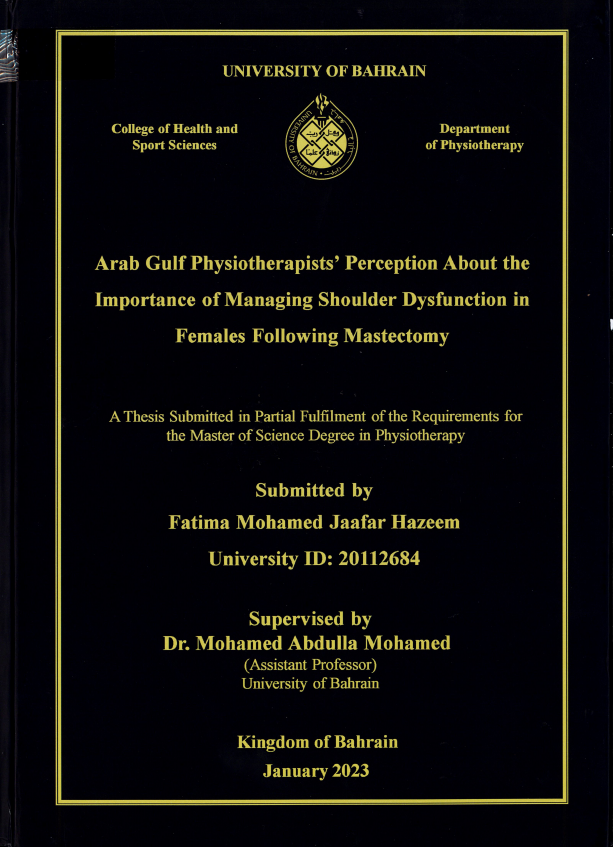Arab Gulf Physiotherapists' Perception About the Importance of Managing Shoulder Dysfunction in Females Following Mastectomy
Linked Agent
Mohamed, Abdulla Mohamed, Thesis advisor
Date Issued
2023
Language
English
Extent
[2], 13, 88, 18 pages.
Subject
Institution
University of Bahrain, College of Health & Sports Sciences, Department of Physiotherapy
English Abstract
Abstract:
Introduction: Shoulder Dysfunction is a common complication among females post- mastectomy. Physiotherapists play an essential role in addressing shoulder dysfunction, but the level of their knowledge, experience, and applied rehabilitation protocols is not known. This research aimed to explore the physiotherapists' knowledge and opinion on managing shoulder dysfunction in females after mastectomy. It also aimed to evaluate their working environment and learning needs. Methods: A cross-sectional online- based survey was conducted over two months, from the end of August to the end of October 2021. Physiotherapists were recruited through the Physiotherapy Associations in Gulf Cooperation Council (GCC) via calls, e-mails, and social media applications. Participants were eligible if they were licensed physiotherapists and residents of GCC. The survey consisted of several sections covering the respondent's demographics, mastectomy knowledge, assessment and preventive procedures, treatment planning, working environment, and learning needs. Social Packages for the Social Sciences (SPSS) software (V26) was used for data analysis. Results: A total of 108 physiotherapists participated in the survey, with the highest participation from Bahrain (33.3%) and the United Arab Emirates (20.4%). A gap in the knowledge about the assessment of mastectomy morbidities and management of shoulder dysfunction was observed in 48.2% of the participants. There is a statistically significant difference between gender and perceptions of treatment, males perceived differently than females (P=0.03, significant at 5%). Also, there is a statistical significance between males and females of their learning need perceptions (P = 0.02, significant at 5%). Moreover, a statistically significance difference in the treatment perception was seen between the therapists treating in-patients and out-patients (P = 0.01, significart at 5%). Lastly, no significant differences were found in perception based on the country of residence (P = 0.66) or level of qualifications (P = 0.891). Conclusion: The results should be used in conjunction with cost-benefit analysis, risk analysis, and assessment of the health requirements of both patients and physiotherapists. Further studies are needed to broaden such findings with larger sample size, propose rehabilitation protocols for treating shoulder dysfunction in female cancer survivors, and set up a specialized
physiotherapy practice for the concerned group.
Note
Title:
وجهة نظر أخصائي العلاج الطبيعي في الخليج العربي حول أهمية إدارة خلل الكتف لدى الإناث بعد استئصال الثدي
وجهة نظر أخصائي العلاج الطبيعي في الخليج العربي حول أهمية إدارة خلل الكتف لدى الإناث بعد استئصال الثدي
Member of
Identifier
https://digitalrepository.uob.edu.bh/id/da2a8ee4-599f-4e62-9349-6f94b9e055aa
Same Subject
